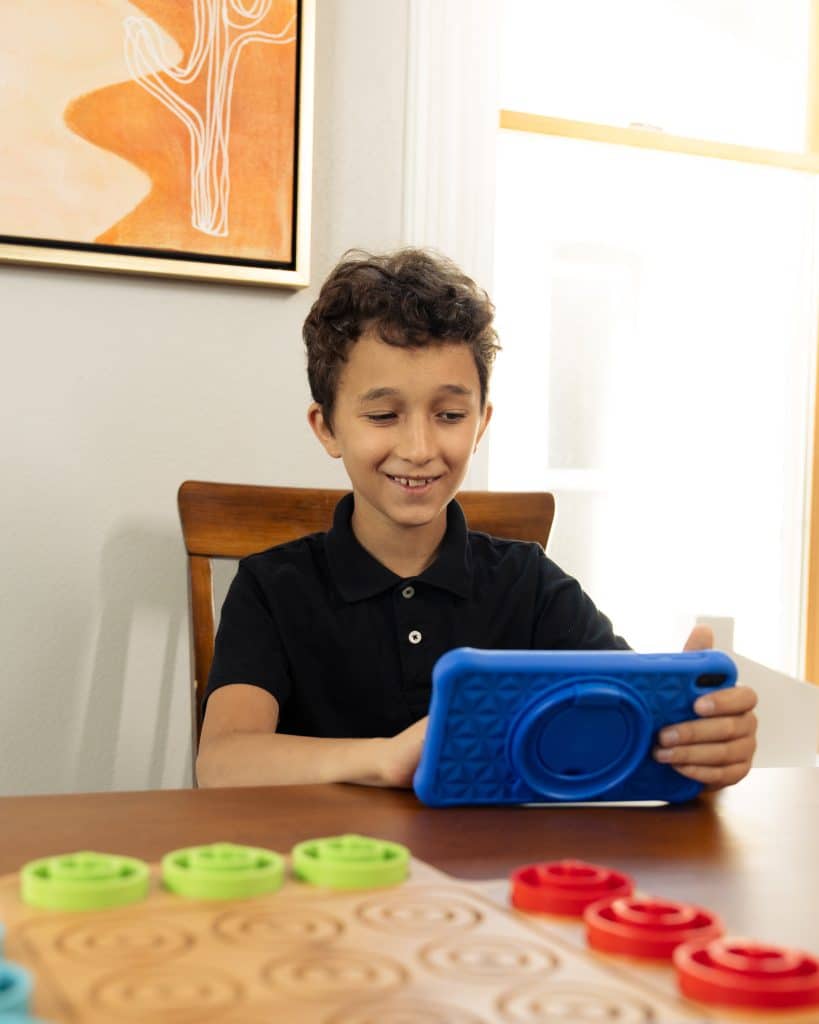Back-to-school season is approaching, so it’s time to start preparing! Whether your child is going to kindergarten for the first time or they’re a seasoned pro, you can do a few things to help them have a successful start to the school year.
Table of Contents
Step 1: Establish a Consistent Routine
Neurodivergent kids often find comfort in routine. It’s like a cozy blanket, wrapping them in predictability and reducing anxiety about the unknown. Start by setting up a consistent daily schedule that includes wake-up times, meals, school, homework, and bedtime. This structure can help your child feel more secure and prepared for the school day.
The Kid’s Tablet for Daily Routines:

Using tech can make routines & time management fun for kids. See all of the apps included on the Goally Kid’s Tablet that build executive functioning skills:
Using a tool like Goally can be a game-changer in establishing routines. Goally is a learning tablet for kids that helps them manage their daily tasks and routines, providing visual cues and reminders that can be especially helpful for neurodivergent kids.
Step 2: Foster Social Skills
For neurodivergent kids, social interactions can sometimes feel like trying to solve a complex puzzle. To prepare for school, work on building these skills at home. Role-play different scenarios, practice turn-taking, and encourage empathy. Remember, it’s not about perfection, but progress.

Read more: Social Skills Groups
Moreover, apps on Goally can help your child practice and improve their social skills in a fun and engaging way. These apps can be a great supplement to your efforts at home.
Step 3: Communicate with the school
Think of your child’s school as your ally in this journey. Effective communication with your child’s school is crucial. Share your child’s strengths, challenges, and effective strategies you use at home. This will help the school staff better understand and support your child’s needs.
It’s also important to keep the lines of communication open throughout the school year. Regular check-ins can help address issues early and ensure your child gets the support they need.
Step 4: Prepare for the Physical Environment
Schools can be sensory-overwhelming places for neurodivergent kids. It’s like stepping into a bustling city after living in a quiet village. Prepare your child by visiting the school beforehand, allowing them to familiarize themselves with the new environment. Discuss potential sensory triggers and brainstorm coping strategies.

For instance, if your child is sensitive to noise, you might discuss strategies like using noise-canceling headphones or finding a quiet spot to retreat to during breaks.
Step 5: Equip Your Child with Coping Strategies
Equip your child with a toolkit of coping strategies to handle stress and anxiety. This could include breathing exercises, fidget tools, or a comforting mantra. These tools can be a lifeline for your child during challenging moments at school.
Read more: Top 5 Coping Activities for Kids
Goally also offers apps to help your child learn and practice coping strategies. These apps can be a great resource for your child, providing them with tools they can use whenever needed.
Step 6: Foster Independence
Encourage independence by teaching your child self-care skills, such as dressing, packing their school bag, and basic hygiene. This will boost their confidence and help them navigate the school day more independently.
Again, Goally can be a great tool in fostering independence. The apps can guide your child through various tasks, helping them learn to do them independently.

"So happy with our Goally devices! " — Goally Mom Learn more →
Step 7: Practice the School Routine
Before school starts, practice the school routine at home. This includes waking up at school, getting dressed, eating breakfast, etc. This rehearsal can help ease the transition when school begins.
Think of it as a dress rehearsal for a play. It helps your child know what to expect and feel more prepared for the big day.
Step 8: Stay Positive and Patient
Lastly, maintain a positive and patient attitude. Remember, every child is unique and progresses at their own pace. Celebrate small victories and keep the lines of communication open with your child.
Evidence shows that kids learn best when they’re having fun. Many teachers recommend using learning tech like Goally to engage with kids in a way they love.

In the classroom, Goally can help kids with:
- Following directions by providing visual supports to help them understand what they are supposed to do.
- Staying on task by providing timers and reminders to help them stay focused.
- Learning new concepts by playing games that make learning fun and engaging.
- Communicating with their teachers and peers by using the AAC Talker app to express themselves.
Goally’s distraction-free kid’s tablet can be used as a therapy tool to help teach executive function, language, emotional regulation, finger dexterity skills, and more!
Back-to-school season can be a time of excitement, anticipation, and even a little stress. But it doesn’t have to be! By following these tips, you can help your child have a successful start to the school year. Each one of the steps above plays a crucial role in helping your child navigate the school environment with confidence and resilience.

Goally
We help parents teach their kids life skills, like doing bedtime and morning independently. Backed by science, we incorporate evidence-based practices and expert-informed designs in all of our apps and content.





